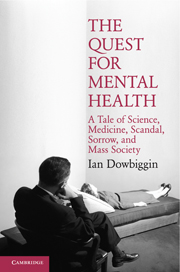Introduction
Published online by Cambridge University Press: 05 June 2012
Summary
“Mental health issues are huge,” exclaimed a Canadian official in 2008, an assertion that may prove to be one of the greatest understatements of the twenty-first century. In 2001 the World Health Organization (WHO) announced its intention to “raise awareness of mental health issues at the highest level of decision and policy making.” The WHO's aim was “to mark the beginning of a new era in the field of mental health care.”
In 2002 former U.S. president George W. Bush created the New Freedom Commission on Mental Health. In 2004 (with Bush's endorsement) the Commission recommended extensive screening of every child in the United States for mental disorders, to be followed by widespread medicating of those diagnosed with psychological problems.
Europe, too, appeared to be caught up in the quest for mental health. In 2005 the European Union (UN) announced a new and urgent strategy to promote mental health. To the twenty-seven countries of the EU, mental illness rivaled cancer as a deadly threat to public health. In 2006 a Canadian Senate committee issued Out of the Shadows at Last, a report that called for a massive overhaul of national mental health policy aimed at helping people with mental disabilities get the services they need and deserve.
The WHO's announcement, EU's strategy, the U.S. president's initiative, and the Canadian report are just some indications that at the beginning of the new century national and international governments on both sides of the Atlantic Ocean seem as dedicated as ever to making mental health one of the most significant policy issues looming over the twenty-first century.
- Type
- Chapter
- Information
- The Quest for Mental HealthA Tale of Science, Medicine, Scandal, Sorrow, and Mass Society, pp. 1 - 7Publisher: Cambridge University PressPrint publication year: 2011

